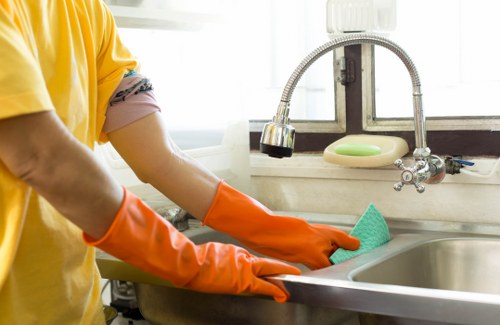Cleaner New Cross: Your Ultimate Guide to a Spotless Community

Keeping New Cross clean is essential for maintaining the area's charm and ensuring a healthy environment for all residents. Whether you're a homeowner, business owner, or simply a visitor, understanding the best practices for cleanliness can make a significant difference.
New Cross, located in the heart of London, is a vibrant neighborhood known for its rich history and diverse community. However, like any bustling area, it faces challenges when it comes to maintaining cleanliness. This article delves into effective cleaning strategies, local initiatives, and how everyone can contribute to a cleaner New Cross.
From waste management to green spaces, we'll explore various aspects that ensure New Cross remains an attractive and hygienic place for everyone. Let's embark on this journey to discover how we can all play a part in enhancing the cleanliness of our beloved New Cross.
Why Cleanliness Matters in New Cross

Cleanliness is not just about aesthetics; it's a crucial factor that affects the health and well-being of the community. A clean environment reduces the risk of illnesses, improves mental health, and fosters a sense of pride among residents.
In New Cross, maintaining cleanliness has additional benefits. It attracts more visitors and businesses, boosting the local economy. A well-kept area also enhances property values, making it a desirable place to live and work.
Moreover, cleanliness initiatives can bring the community together. Events like neighborhood clean-ups not only help in keeping the area spotless but also strengthen the bonds among residents.
Health Benefits of a Clean Environment

A clean environment significantly lowers the chances of spreading infectious diseases. Proper waste disposal and sanitation practices prevent the proliferation of bacteria and viruses.
Additionally, clean streets and public spaces reduce the presence of pests like rodents and insects, which can carry harmful pathogens.
For children and the elderly, a clean environment ensures safer play areas and public spaces, contributing to overall community health.
Economic Advantages

A clean neighborhood is more appealing to tourists and potential investors. This increased interest can lead to more business opportunities and job creation.
Local businesses benefit from higher foot traffic in clean and inviting areas. Shoppers are more likely to visit and spend time in neighborhoods that are well-maintained.
Furthermore, property owners can enjoy higher rental and sale values, providing financial incentives to maintain cleanliness.
Effective Cleaning Strategies for New Cross

Implementing effective cleaning strategies involves a combination of community effort, local government support, and sustainable practices. Here are some key strategies to keep New Cross clean:
- Regular Waste Collection: Ensure timely and efficient waste collection services to prevent accumulation of garbage.
- Recycling Programs: Promote recycling through accessible bins and public awareness campaigns.
- Public Clean-Up Events: Organize community clean-up days to engage residents in maintaining their environment.
- Maintenance of Green Spaces: Regularly maintain parks and gardens to keep them lush and free from litter.
- Education and Awareness: Educate the community about the importance of cleanliness and how they can contribute.
Waste Management Solutions
Effective waste management is the cornerstone of a clean neighborhood. In New Cross, this involves providing sufficient waste bins, scheduling regular pickups, and encouraging proper disposal practices.
Implementing separate bins for recyclables, organic waste, and general trash can streamline the disposal process and promote recycling.
Furthermore, collaborating with local waste management companies ensures that waste is handled responsibly and efficiently.
Promoting Recycling
Recycling reduces the strain on landfills and conserves natural resources. New Cross can enhance its recycling efforts by placing clearly marked bins in public areas and providing information on what can be recycled.
Schools and community centers can play a pivotal role by organizing recycling drives and educating the younger generation about the importance of recycling.
Incentives for residents who actively participate in recycling programs can also boost community engagement.
Community Engagement
Engaging the community is vital for sustained cleanliness. Encouraging residents to take ownership of their surroundings fosters a collective responsibility.
Local councils can host workshops and seminars to teach effective cleaning techniques and the benefits of maintaining a clean environment.
Volunteer groups can be formed to undertake regular cleaning activities, making it a shared effort among neighbors.
Local Government Initiatives

The local government plays a crucial role in maintaining cleanliness in New Cross. Through policies, funding, and community programs, they can create an environment that prioritizes cleanliness.
Initiatives such as street cleaning schedules, provision of public bins, and enforcement of anti-littering laws are essential.
Additionally, the government can support green projects like tree planting and maintenance of public parks, enhancing the overall aesthetic of the area.
Street Cleaning Programs

Regular street cleaning ensures that public areas remain free from litter and debris. Using eco-friendly cleaning agents and modern equipment can make these programs more effective.
Nightly street cleaning can prevent the accumulation of waste, particularly in busy areas like markets and transport hubs.
Community feedback can help identify problem areas and adjust cleaning schedules accordingly.
Enforcing Anti-Littering Laws

Strict enforcement of anti-littering laws deters individuals from discarding waste improperly. Fines and penalties can be effective in promoting compliance.
Public awareness campaigns highlighting the consequences of littering can further reinforce these laws.
Collaborating with local businesses to ensure that their patrons also adhere to cleanliness standards can enhance overall efforts.
Support for Green Projects

Investing in green projects like parks, community gardens, and tree plantings not only beautifies the area but also promotes environmental sustainability.
Green spaces provide residents with places to relax and engage in recreational activities, contributing to better mental health.
Moreover, trees and plants help in reducing air pollution and maintaining urban biodiversity.
Role of Businesses in Promoting Cleanliness

Businesses in New Cross can contribute significantly to maintaining cleanliness. From proper waste disposal to supporting community clean-up events, their involvement is crucial.
Encouraging employees to participate in environmental initiatives fosters a culture of responsibility and care for the community.
Additionally, businesses can sponsor local cleaning projects, providing both financial and logistical support.
Proper Waste Disposal
Businesses should ensure that their waste is disposed of correctly. Implementing recycling programs and minimizing the use of single-use plastics can make a substantial impact.
Providing clearly labeled bins for different types of waste within business premises encourages both employees and customers to dispose of waste appropriately.
Regular training sessions on waste management practices can further enhance these efforts.
Supporting Community Clean-Up Events
By participating in or sponsoring community clean-up events, businesses demonstrate their commitment to the local area. This not only improves the environment but also builds a positive reputation among residents.
Collaborating with local councils to organize large-scale clean-ups can pool resources and achieve better results.
Recognition programs for participating businesses can motivate more to get involved.
Eco-Friendly Practices
Adopting eco-friendly practices, such as reducing energy consumption, using sustainable materials, and minimizing waste, can greatly contribute to the cleanliness of New Cross.
Businesses can implement green certifications to showcase their commitment to environmental sustainability.
Moreover, educating customers about these practices encourages them to support and engage in eco-friendly behaviors.
Educational Initiatives and Awareness

Education plays a pivotal role in promoting cleanliness. By raising awareness about the importance of a clean environment, residents can be more motivated to contribute actively.
Schools, local organizations, and community groups can collaborate to deliver educational programs that emphasize the benefits of cleanliness and sustainable living.
Interactive workshops and informational campaigns can help in spreading the message effectively.
School Programs

Integrating cleanliness and environmental education into school curricula ensures that children understand the importance of maintaining a clean environment from a young age.
Organizing school-wide clean-up drives and recycling contests can engage students actively in community cleaning efforts.
Partnering with local businesses to provide resources and support for these initiatives can enhance their effectiveness.
Community Workshops

Workshops focusing on practical cleaning techniques, waste management, and sustainable practices equip residents with the knowledge and skills needed to maintain cleanliness.
Inviting experts to speak at these workshops can provide valuable insights and encourage participation.
Providing take-home materials and resources ensures that the information is accessible and actionable.
Public Awareness Campaigns

Public awareness campaigns using posters, flyers, social media, and local media channels can effectively communicate the importance of cleanliness and how individuals can contribute.
Highlighting success stories and positive impacts can inspire others to take action.
Consistent messaging reinforces the importance of maintaining a clean environment.
Encouraging Sustainable Practices

Sustainability and cleanliness go hand in hand. Encouraging sustainable practices reduces waste and promotes a healthier environment.
Simple actions like using reusable bags, reducing water usage, and composting organic waste can collectively make a significant difference.
Incentivizing these practices through rewards or recognition can further promote their adoption among residents.
Reducing Single-Use Plastics
Single-use plastics contribute significantly to environmental pollution. By reducing their usage, New Cross can decrease waste and promote sustainability.
Promoting alternatives like reusable bags, bottles, and containers encourages residents to make eco-friendly choices.
Implementing bans or restrictions on certain types of single-use plastics can also drive change.
Water Conservation
Water is a precious resource, and conserving it is essential for sustainability. Encouraging practices like fixing leaks, using water-efficient appliances, and mindful water usage can help preserve this vital resource.
Community programs that educate residents on the importance of water conservation can lead to more responsible usage patterns.
Incentives for households that successfully reduce their water consumption can boost participation.
Composting Organic Waste
Composting organic waste reduces the amount of garbage sent to landfills and enriches the soil, promoting healthy plant growth.
Providing compost bins and educating residents on how to compost effectively can enhance participation.
Community composting sites can also serve as shared resources for residents who may not have space for individual composting.
10-15 Closest Areas to New Cross
New Cross is surrounded by several vibrant areas, each contributing uniquely to the cleanliness and overall appeal of the region. Here are the closest areas to New Cross:
- Deptford: Just north of New Cross, Deptford offers historic sites and the bustling Deptford Market, promoting active community involvement in cleanliness.
- Lewisham: Situated southeast, Lewisham boasts numerous green spaces and organized waste management programs.
- Herne Hill: West of New Cross, Herne Hill is known for its large park and community gardens, maintaining high cleanliness standards.
- Penge: South of New Cross, Penge features charming residential areas with active neighborhood clean-up initiatives.
- Forest Hill: Northeast, Forest Hill is celebrated for its public parks and environmental sustainability projects.
- Peckham: Southwest, Peckham has vibrant streetscapes with organized recycling efforts and clean public spaces.
- West Norwood: West, West Norwood supports numerous community-led cleanliness programs and maintains pristine local parks.
- Sydenham: Northwest, Sydenham is home to beautiful green areas and effective waste disposal systems.
- Honor Oak: North, Honor Oak promotes sustainable living with various eco-friendly community projects.
- East Dulwich: Farther northwest, East Dulwich has a strong focus on maintaining clean streets and public areas.
- Blackheath: East, Blackheath balances historical charm with modern cleanliness practices, ensuring a tidy environment.
- Crystal Palace: Far northeast, Crystal Palace combines extensive green spaces with active waste management initiatives.
- Maudsley Garden Village: South, this area emphasizes eco-friendly living and cleanliness in its residential planning.
- Gipsy Hill: Southwest, Gipsy Hill supports community clean-up events and maintains high standards of neighborhood cleanliness.
- Lee: Northwest, Lee focuses on effective waste collection and recycling programs to keep the area clean.
Deptford
Deptford is renowned for its historical landmarks and active community markets. The area's commitment to cleanliness is evident through regular market clean-ups and preservation of its rich heritage.
Lewisham
Lewisham offers numerous parks and recreational areas. The local council's waste management programs ensure that these spaces remain clean and inviting for all.
Herne Hill
With its expansive Herne Hill Park and community gardens, Herne Hill prioritizes green maintenance and encourages residents to participate in upkeep activities.
Penge
Penge's residential charm is supported by active neighborhood associations that organize regular clean-up drives and promote sustainable living.
Forest Hill
Forest Hill is celebrated for its public parks and environmental projects. Initiatives like tree planting and recycling campaigns are common.
Peckham
Peckham's vibrant streets and public spaces are maintained through organized recycling efforts and community clean-ups that engage local businesses and residents.
West Norwood
West Norwood supports cleanliness through numerous community-led programs and meticulously maintained local parks.
Sydenham
Sydenham boasts beautiful green areas and an efficient waste disposal system, ensuring that the neighborhood remains clean and sustainable.
Honor Oak
Honor Oak focuses on sustainable living with various eco-friendly community projects that promote cleanliness and environmental responsibility.
East Dulwich
East Dulwich emphasizes clean streets and public areas through strong community involvement and effective waste management strategies.
Blackheath
Blackheath combines historical charm with modern cleanliness practices, ensuring that its streets and parks are well-maintained and inviting.
Crystal Palace
Crystal Palace's extensive green spaces and active waste management initiatives keep the area clean and eco-friendly.
Maudsley Garden Village
Maudsley Garden Village emphasizes eco-friendly living, integrating cleanliness into its residential planning and community activities.
Gipsy Hill
Gipsy Hill supports community clean-up events and maintains high standards of neighborhood cleanliness through active resident participation.
Lee
Lee focuses on effective waste collection and recycling programs, ensuring the area remains clean and environmentally sustainable.
How You Can Contribute to a Cleaner New Cross

Everyone has a role to play in maintaining the cleanliness of New Cross. Here are some simple yet effective ways you can contribute:
- Dispose of Waste Properly: Always use designated bins and follow local disposal guidelines to prevent littering.
- Recycle: Separate recyclable materials from general waste and ensure they are placed in the appropriate recycling bins.
- Participate in Clean-Up Events: Join community clean-up drives to help maintain public spaces.
- Reduce Single-Use Items: Opt for reusable bags, bottles, and containers to minimize waste.
- Educate Others: Spread awareness about the importance of cleanliness and encourage others to take part.
Proper Waste Disposal

Ensuring that waste is disposed of correctly prevents litter from accumulating and keeps the environment clean. Always look for designated waste bins and avoid leaving trash in public areas.
When in doubt, follow local guidelines or contact the local council for proper disposal methods.
Your small effort in disposing of waste properly can lead to significant improvements in the community's cleanliness.
Recycling Efforts

Recycling helps reduce the amount of waste that ends up in landfills. By separating recyclables like paper, plastic, and glass, you contribute to a sustainable environment.
Make sure to rinse and clean recyclables before placing them in the appropriate bins to ensure they are processed effectively.
Participating in recycling programs not only helps the environment but also sets a good example for others in the community.
Joining Clean-Up Drives

Clean-up drives are excellent opportunities to give back to the community. By joining these events, you help keep public spaces free from litter and promote a sense of community pride.
Participating in these activities also allows you to connect with your neighbors and work together towards a common goal.
Stay informed about upcoming clean-up events through local councils or community groups and make an effort to participate regularly.
Reducing Single-Use Items

Single-use items like plastic bags and bottles contribute significantly to waste. By reducing their usage, you help decrease the overall waste in the community.
Carry reusable bags and bottles wherever you go to minimize the need for single-use plastics.
Encourage businesses to provide eco-friendly alternatives and support local initiatives aimed at reducing waste.
Spreading Awareness

Educating others about the importance of cleanliness and how they can contribute is crucial. Share information through social media, community boards, or word of mouth.
Organize or participate in awareness campaigns that highlight the benefits of a clean environment.
Empowering others with knowledge can lead to a collective effort in maintaining the cleanliness of New Cross.
The Future of Cleanliness in New Cross

The future of New Cross looks promising with continued efforts to maintain and improve cleanliness standards. Ongoing community engagement, innovative waste management solutions, and sustainable practices will play pivotal roles.
Advancements in technology can offer new ways to manage waste and monitor cleanliness efficiently. Implementing smart bins and real-time monitoring systems can enhance waste collection processes.
Furthermore, fostering a culture of sustainability and responsibility among residents ensures that cleanliness remains a top priority for years to come.
Innovative Waste Management

Embracing innovative waste management techniques can streamline the cleaning process. Technologies like automated waste collection systems and smart bins provide efficient solutions to traditional waste issues.
These technologies can optimize waste collection schedules, reduce operational costs, and improve overall efficiency.
Investing in such innovations demonstrates a commitment to maintaining a clean and modern New Cross.
Community Sustainability Programs

Developing community sustainability programs encourages residents to adopt eco-friendly habits. These programs can include initiatives like energy conservation, water preservation, and sustainable gardening.
By integrating these practices into daily life, the community can significantly reduce its environmental footprint.
Continuous education and support are essential to the success of these programs.
Technology Integration

Integrating technology into cleanliness efforts can lead to smarter and more efficient solutions. From mobile apps that report littering to online platforms that coordinate community clean-ups, technology can facilitate better management and participation.
Using data analytics to track waste patterns and cleanliness levels can help in making informed decisions and improving strategies.
Adopting such technologies ensures that New Cross remains at the forefront of cleanliness and sustainability.
Conclusion

Maintaining cleanliness in New Cross is a collective effort that benefits everyone in the community. By adopting effective cleaning strategies, supporting local government initiatives, engaging businesses, and promoting educational programs, New Cross can remain a vibrant and spotless neighborhood.
Every individual can contribute through simple actions like proper waste disposal, recycling, and participating in community events. Together, we can ensure that New Cross continues to thrive as a clean, healthy, and welcoming place for all.
Embracing sustainability and innovation will pave the way for a brighter, cleaner future, making New Cross a model for other communities to follow.
Frequently Asked Questions

- What are the key responsibilities of a cleaner in New Cross?
A cleaner in New Cross is responsible for maintaining the cleanliness of public spaces, managing waste disposal, and ensuring that recycling guidelines are followed. They may also participate in community clean-up events and collaborate with local businesses to promote cleanliness.
- How can residents participate in keeping New Cross clean?
Residents can contribute by disposing of waste properly, recycling, reducing the use of single-use plastics, and participating in community clean-up events. Additionally, spreading awareness about the importance of cleanliness helps foster a collective responsibility.
- What initiatives does the local government have for cleanliness in New Cross?
The local government supports regular waste collection, recycling programs, street cleaning schedules, and green projects like park maintenance and tree planting. They also enforce anti-littering laws and organize community clean-up events.
- Are there recycling facilities available in New Cross?
Yes, New Cross has multiple recycling facilities and designated recycling bins placed in public areas. The community is encouraged to separate recyclables from general waste to promote effective recycling.
- How can businesses in New Cross support cleanliness efforts?
Businesses can support cleanliness by implementing proper waste disposal and recycling practices, reducing the use of single-use plastics, sponsoring community clean-up events, and adopting eco-friendly practices within their operations.


